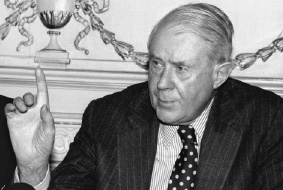Cyrus Vance
Cyrus Roberts Vance, a principled statesman, died on January 12th 2002, aged 84

When Cyrus Vance decided to resign in 1980 he sought to do it with a minimum of fuss, for that was his style. He wrote to his president, Jimmy Carter, that a plan to try to rescue by force 52 Americans held prisoner in the United States embassy in Tehran had been made against his judgment and that he was resigning as secretary of state, whether the mission succeeded or failed. Several days later, when the mission had failed, dismally, Mr Vance’s resignation was made public. But he was not allowed to bow out quietly. No one could remember a secretary of state, the highest post in the cabinet, resigning on a matter of principle. It took some searching to find a single precedent, William Jennings Bryan, a pacifist who had resigned as secretary of state in 1915 because he believed American policy favoured joining the war in Europe.
Mr Vance was not a pacifist. He had served in the navy in the second world war, and saw action in the Pacific. He had no liking for the revolutionary government that had taken over Iran. But he believed that some of the American prisoners might die in an attack, and that even if the mission, called Eagle Claw, were successful it would disturb an already unstable region. He was doubtful about the ability of the army to cope with conditions in a land they had no knowledge of. He had no great faith in the marvels of military technology. In 1962, when he was secretary of the army, the walkie-talkies of soldiers guarding blacks from white supremacists in the southern states failed at crucial moments. His misgivings were justified. Eagle Claw never got near the prisoners. Helicopters that were the mainstay of the mission were disabled in an unanticipated sandstorm in the Iranian desert. Eight American servicemen died and eight aircraft were lost. The mission was judged a brave one, but stupid. The embassy Americans were eventually freed as a result of painstaking negotiation, a process Mr Vance had pressed for.
Cyrus Vance was aware that, despite his exalted job, others could have a say in making and carrying out American foreign policy, particularly at times of great national stress. (The present star in the war against terrorism is the defence secretary, Donald Rumsfeld, a man of strong words and once a champion wrestler.) At the time of Eagle Claw Mr Vance’s rival for President Carter’s ear was his hawkish national security adviser, Zbigniew Brzezinski.
For much of his three years as secretary of state Mr Vance was uneasy as he battled with Mr Brzezinski for influence over foreign policy. Mr Vance knew that the president backed him in many ways, particularly in the view that human rights should be a pillar of American foreign policy; that was one of the reasons he had been picked for the job. But in the run-up to an election against Ronald Reagan, Mr Carter wanted to show that he could be tough with the Iranians. Mr Vance was even bothered that his office in the State Department was a mile or so from the White House, whereas Mr Brzezinski’s office was next door to the president’s. Even the great and the good exhibit human fears.
Polish-born Mr Brzezinski, a naturalised American, was clever, ambitious and ten years younger than Mr Vance. He saw him, he wrote later, as a relic of “the once dominant WASP elite” whose “values and rules were of declining relevance”. Mr Vance was indeed a WASP, born to a prosperous family in West Virginia and expensively educated. He had a successful career as a lawyer and seemingly was without political ambition. He once said,
A lot of us were raised in families where we were taught that we were very fortunate, that we were going to have a good education, and that we had the responsibility to return to thecommunity some of the benefits and blessings we had, and that there was an obligation to participate in government service at the local, state and national level.
For some 30 years various presidents, among them John Kennedy and Lyndon Johnson as well as Jimmy Carter, together with international organisations, valued his WASPish talents. His departure as secretary of state did not end his service to government and the United Nations. He would be lured away from his law practice, given a working title, special this or special that, and asked to take on problems that had no solutions but could perhaps be made less menacing. So he went off to the Middle East, to the Balkans, to the Koreas, to Cyprus, and, until it broke up and created a new set of problems, to the Soviet Union. He was sceptical of any proposed American “master plan” for the world. His method was to take each problem, look at it as a lawyer would a brief, judge what could be negotiated, and draw up a contract.
Mr Vance was sometimes compared with another indefatigable American traveller, Henry Kissinger. Philip Habib, an American career diplomat who worked with many negotiators, greatly admired Mr Kissinger. His capacity “to put things together, to move, to produce the precise word at the right time, and his wit, were marvellous things to behold”. But Cyrus Vance’s “absolute, total and complete honesty” made him “probably the finest public servant I ever worked with”. Not bad for a WASP of declining relevance.